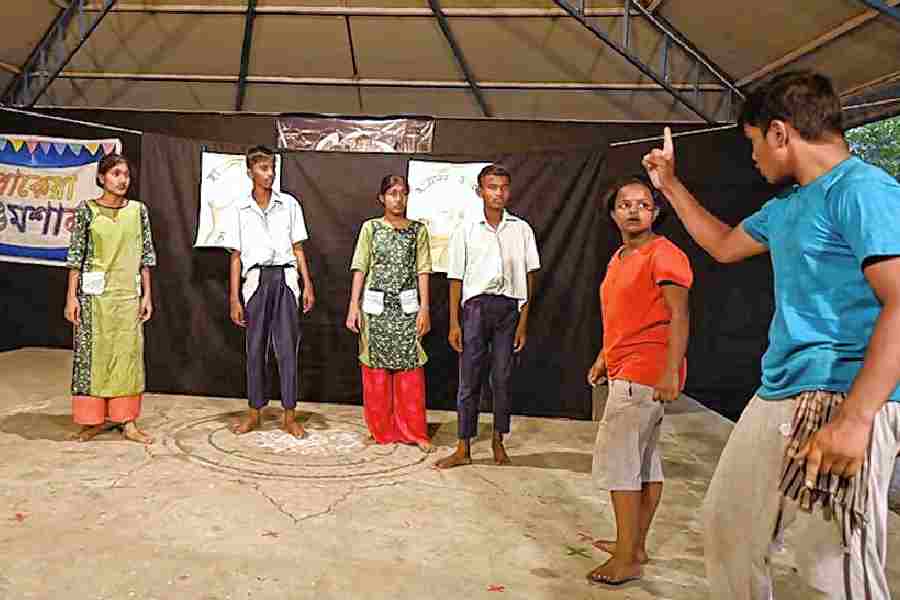Annual day of first-generation learners hosted at Rokeya Shiksha Kendra


The launch of a magazine with a chapter on the history of a neighbourhood. Songs of communal amity. Contemporary adaptations of topical plays. A session where science triumphs superstition.
All of this and more marked the annual day celebrations of a school for first-generation learners in and around Patuli, off EM Bypass.
The celebrations on Saturday reflected the learning model at Rokeya Shiksha Kendra, where education is not just book-based. Practical assignments, film screenings and library sessions are an integral part of that learning.
Motichur, the 80-page magazine with writings and paintings of Rokeya’s students, teachers and well-wishers, has a special chapter on the history of Patuli. A bunch of students of Class X interviewed six residents of the area for a sense of the local history. One of them is originally from the Sunderbans and another from Jharkhand.
Three plays staged by students were among the prime attractions of the day-long celebrations organised at a park in Patuli.
One of them was an adaptation of Rajar Asukh, a story by Sukumar Ray. The original story revolves around a king who is looking for a cure for his disease. In the stage adaptation, titled Asol Raja, Nokol Raja (The Real King, The Fake King), the king is told that his ailment can be cured by someone who has real friends, not just Facebook friends.
Another play was Hottomalar Opare, by Badal Sircar. It is about two thieves who jump into a river in a bid to escape and land up on the shores of a land where money and material possessions have no value, where buying and selling are alien ideas.
“Learning based on only books can be challenging for students from affluent families. For first-generation learners, it is doubly difficult. A formal school education system has largely failed these children. We want their learning to be practical. The project on Patuli’s history is an example. It gives them a sense of history around them, something that has not been written about in detail,” said Kasturi Basu, one of the founders of Rokeya.
The same approach drives film screenings and library sessions at Rokeya. Some of the students are volunteers at a people-funded, independent film festival in south Kolkata.
The centre — named after Rokeya Sakhawat Hossain (1880-1932), Bengal’s pioneering Muslim feminist writer, educationist and activist — has over 130 students who live in slums in and around Patuli.
Rokeya had opened when a raging pandemic had forced the closure of schools. While digital learning was breaking new grounds, it seemed an alien concept for many children whose parents were struggling to keep the kitchen fire burning.
Most of the students of Rokeya are enrolled in a government school. But the bulk of their learning happens in Rokeya.
Around 20 teachers have come on board to take classes at the centre. They are teaching for free. The nominal fee taken from students goes into paying rent and buying books and stationery. A community kitchen serves hot meals to the students.
A group called Humans of Patuli, which started as a citizens’ movement to resist the Centre’s citizenship thrust at the grassroots level, is the driving force behind the centre.
The students are taught about the secular values enshrined in the Constitution.
On Saturday, the celebrations included a session called Ei Desh Tomar Amar (This country is yours and mine), a compilation of songs and poems that celebrate India’s pluralism and togetherness.
Another session, titled Juktibad Zindabad (Long Live Rationalism), had two representatives of Bharatiya Bigyan O Yuktibadi Samiti (Science and Rationalists’ Association of India) conduct a workshop.
The representatives talked about superstitions, old and new.
They alerted the students against midbrain activation, a technique that claims to improve memory and concentration by blindfolding people. They also busted age-old myths of people being possessed by a spirit.
The audience included teachers, parents of the children and well-wishers of Rokeya.
“We want Rokeya to be a place where children would learn with joy, imagination and curiosity, as well as hold their neighbourhood community together, with love and empathy,” said Basu.